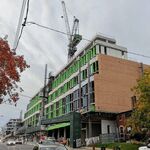Toronto Prosperity Initiative report needs a big tweak
By Stephen Dupuis..the Toronto Star
I broke one of my own rules last week by commenting on a report which had been described to me but which I had not read myself.
When the print reporter called to tell me the Toronto Prosperity Initiative was recommending a 33 to 50 per cent reduction in development approval timelines, I said that was “music to my ears.”
Preparing for a subsequent cable television call-in show, I read the report — Toronto Prosperity Initiative: Establishing the Path to Growth — from cover to cover. Much to my chagrin, I discovered that the streamlining recommendation appears to pertain only to non-residential development. Does that mean that residential development will get in line behind the offices and industrial buildings? Forget that!
With all due respect to the members of the committee who produced the report, I simply have to say that any streamlining of the development approvals process has to be across the board.
Here’s why: the residential construction industry in the 416 area of the GTA is an $8.2 billion industry which will spin off 75,000 jobs this year while paying out $3.9 billion in wages and more than $2 billion in taxes to the federal and provincial governments, not to mention development charges and a rich, long-term assessment base to the City of Toronto.
Toronto is the largest highrise housing market in North America by far, and the city is the envy of municipal leaders around the world for the wonderful way in which it has emerged as a place to live, work and play.
No doubt, the authors of the report were thinking about employing people and providing workplaces in the City of Toronto — and that’s fair — but they should be looking at condo construction cranes as factories unto themselves.
I’m sure if the authors were to consult with the local restaurants and service companies surrounding recently occupied condo buildings, they would hear about the instant impact those new residents represent.
Among the things I do appreciate about the report is the way in which it shines a light on the approvals process, which I sometimes feel has become an end in itself rather than a means to an end. I really like that the report also recognizes that streamlining will require a cultural shift over and above process engineering. The call for a regional economic competitiveness strategy and implementation plan is great because it’s coming from Toronto itself, as is the recommendation to systematically review regulations, procedures and permits to remove barriers to job creation and investment.
Another recommendation to expedite the approval process and funding to accelerate development and densification of the waterfront is to use the 2015 Pan/Parapan American Games as a catalyst. Well, guess what? One of the biggest projects within that entire redevelopment scheme will be the housing for the athletes. Given the development approvals pending for that massive project, combined with the regular application flow from the development industry, streamlining is emerging as critical.
I can’t let this topic go without mentioning that developers pay very hefty fees for city planning and legal staff to review their proposals, and for building staff to review the drawings and inspect the work in progress.
We have sent the message to the city’s Economic Development Committee that both residential and non-residential buildings go hand-in-hand to contribute to city building. The report of the Toronto Prosperity Initiative needs one great big tweak to recognize that point.
http://www.thestar.com/article/1004...rosperity-initiative-report-needs-a-big-tweak




